How Social Movements Challenge Inequality: A Comprehensive Analysis
VerifiedAdded on 2021/01/02
|8
|1890
|254
Essay
AI Summary
This essay delves into the ways social movements challenge inequality, focusing on economic disparities and gender inequality, particularly within the context of Europe. It examines the roles of human rights and new feminism in addressing these issues. The essay explores the legal, political, and sociological perspectives that shape these movements and their impact. It analyzes how various factors such as laws, policies, and societal structures influence inequality and the efforts to combat it. The study covers the challenges faced by European countries and the strategies employed to promote equality, including legal frameworks, political actions, and sociological approaches. The conclusion highlights the importance of social movements in driving change and the ongoing challenges in achieving true equality across various dimensions.
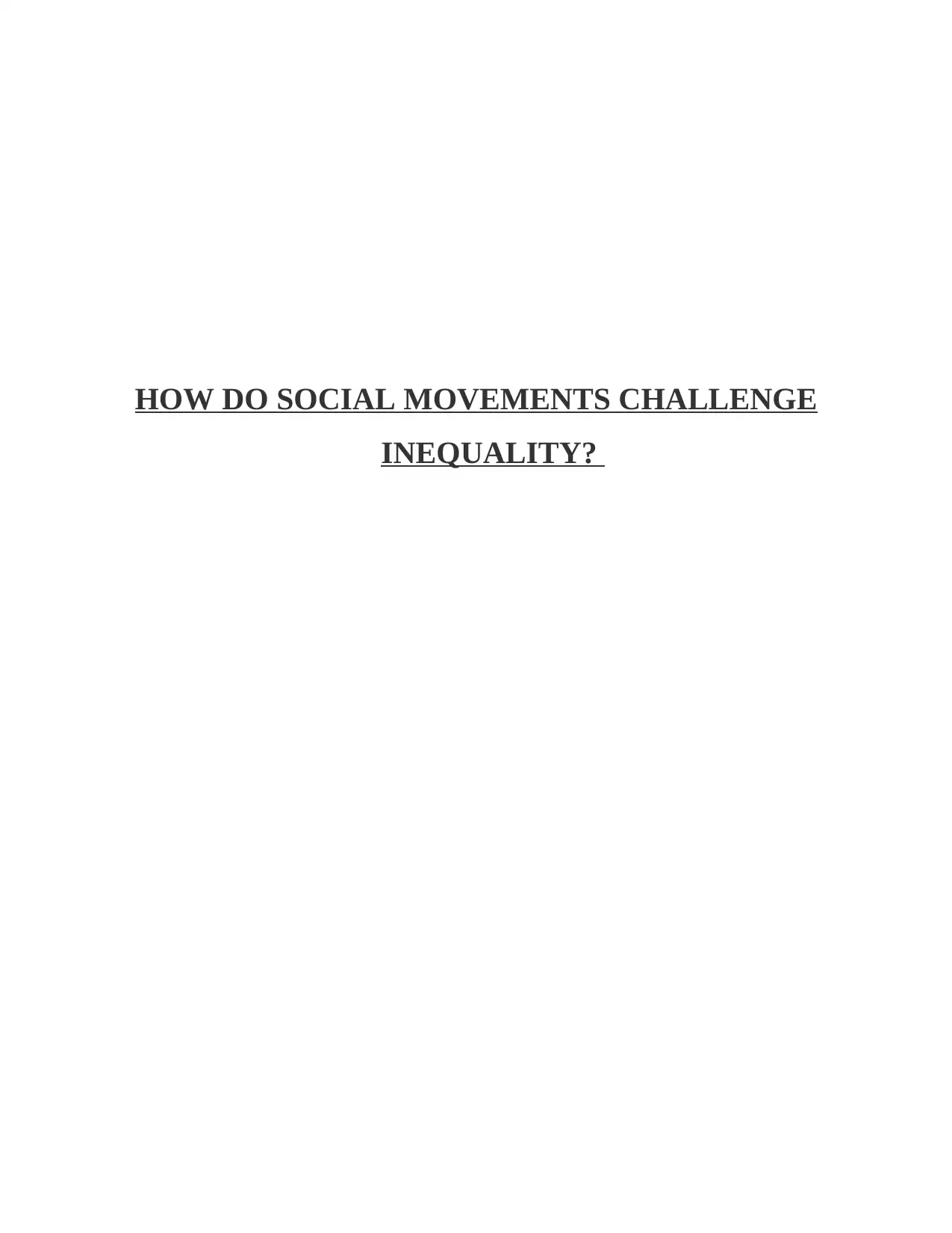
HOW DO SOCIAL MOVEMENTS CHALLENGE
INEQUALITY?
INEQUALITY?
Paraphrase This Document
Need a fresh take? Get an instant paraphrase of this document with our AI Paraphraser
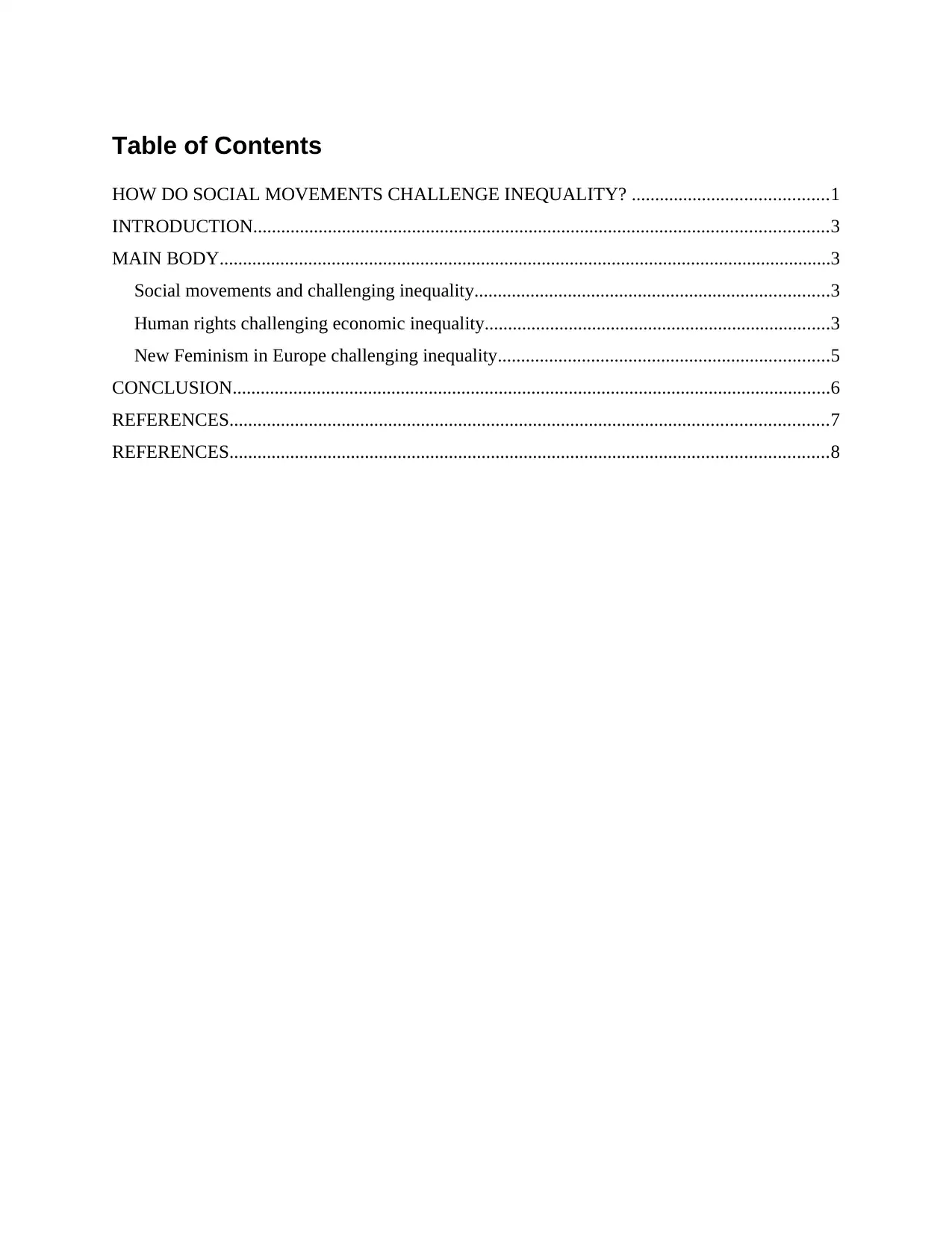
Table of Contents
HOW DO SOCIAL MOVEMENTS CHALLENGE INEQUALITY? ..........................................1
INTRODUCTION...........................................................................................................................3
MAIN BODY...................................................................................................................................3
Social movements and challenging inequality............................................................................3
Human rights challenging economic inequality..........................................................................3
New Feminism in Europe challenging inequality.......................................................................5
CONCLUSION................................................................................................................................6
REFERENCES................................................................................................................................7
REFERENCES................................................................................................................................8
HOW DO SOCIAL MOVEMENTS CHALLENGE INEQUALITY? ..........................................1
INTRODUCTION...........................................................................................................................3
MAIN BODY...................................................................................................................................3
Social movements and challenging inequality............................................................................3
Human rights challenging economic inequality..........................................................................3
New Feminism in Europe challenging inequality.......................................................................5
CONCLUSION................................................................................................................................6
REFERENCES................................................................................................................................7
REFERENCES................................................................................................................................8
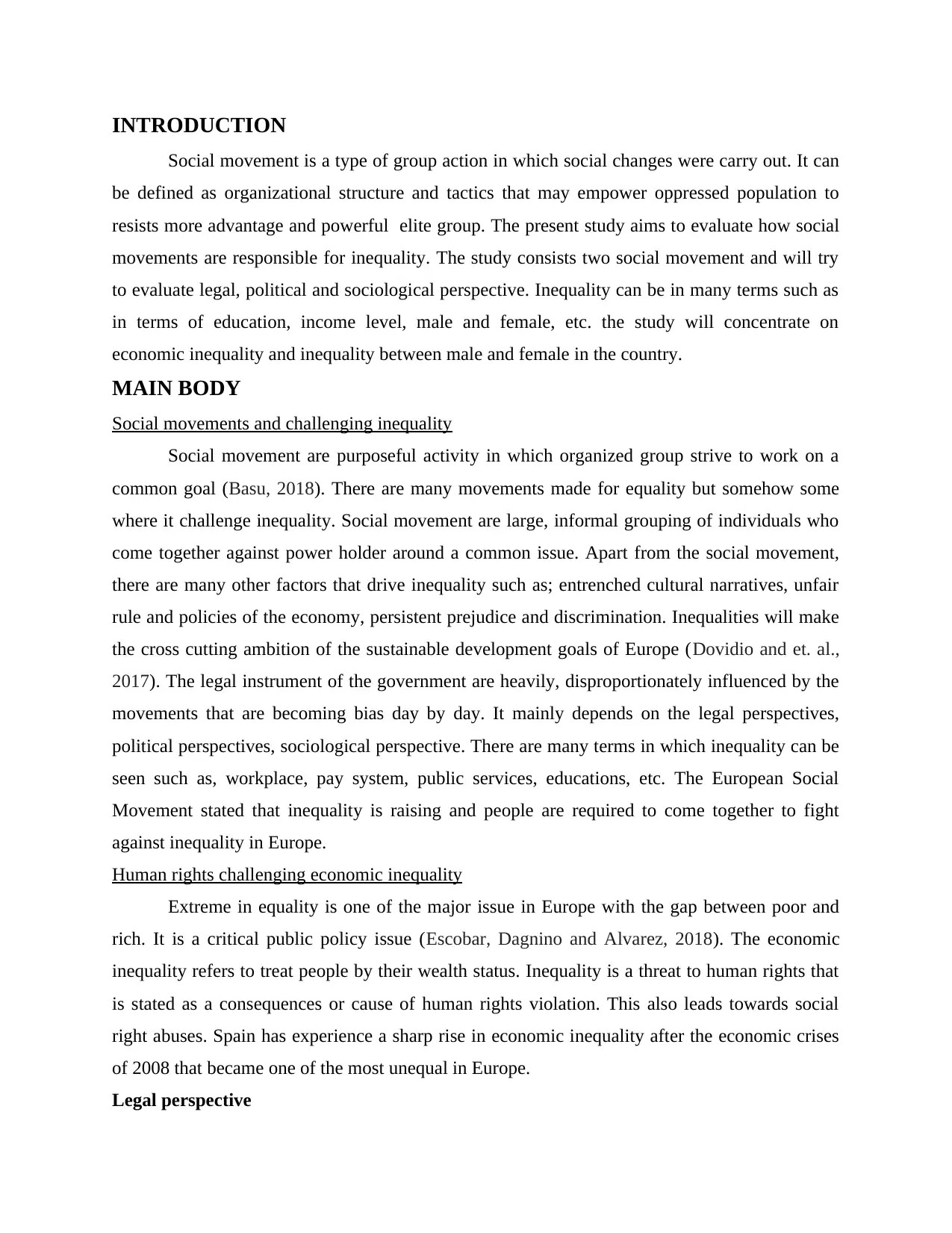
INTRODUCTION
Social movement is a type of group action in which social changes were carry out. It can
be defined as organizational structure and tactics that may empower oppressed population to
resists more advantage and powerful elite group. The present study aims to evaluate how social
movements are responsible for inequality. The study consists two social movement and will try
to evaluate legal, political and sociological perspective. Inequality can be in many terms such as
in terms of education, income level, male and female, etc. the study will concentrate on
economic inequality and inequality between male and female in the country.
MAIN BODY
Social movements and challenging inequality
Social movement are purposeful activity in which organized group strive to work on a
common goal (Basu, 2018). There are many movements made for equality but somehow some
where it challenge inequality. Social movement are large, informal grouping of individuals who
come together against power holder around a common issue. Apart from the social movement,
there are many other factors that drive inequality such as; entrenched cultural narratives, unfair
rule and policies of the economy, persistent prejudice and discrimination. Inequalities will make
the cross cutting ambition of the sustainable development goals of Europe (Dovidio and et. al.,
2017). The legal instrument of the government are heavily, disproportionately influenced by the
movements that are becoming bias day by day. It mainly depends on the legal perspectives,
political perspectives, sociological perspective. There are many terms in which inequality can be
seen such as, workplace, pay system, public services, educations, etc. The European Social
Movement stated that inequality is raising and people are required to come together to fight
against inequality in Europe.
Human rights challenging economic inequality
Extreme in equality is one of the major issue in Europe with the gap between poor and
rich. It is a critical public policy issue (Escobar, Dagnino and Alvarez, 2018). The economic
inequality refers to treat people by their wealth status. Inequality is a threat to human rights that
is stated as a consequences or cause of human rights violation. This also leads towards social
right abuses. Spain has experience a sharp rise in economic inequality after the economic crises
of 2008 that became one of the most unequal in Europe.
Legal perspective
Social movement is a type of group action in which social changes were carry out. It can
be defined as organizational structure and tactics that may empower oppressed population to
resists more advantage and powerful elite group. The present study aims to evaluate how social
movements are responsible for inequality. The study consists two social movement and will try
to evaluate legal, political and sociological perspective. Inequality can be in many terms such as
in terms of education, income level, male and female, etc. the study will concentrate on
economic inequality and inequality between male and female in the country.
MAIN BODY
Social movements and challenging inequality
Social movement are purposeful activity in which organized group strive to work on a
common goal (Basu, 2018). There are many movements made for equality but somehow some
where it challenge inequality. Social movement are large, informal grouping of individuals who
come together against power holder around a common issue. Apart from the social movement,
there are many other factors that drive inequality such as; entrenched cultural narratives, unfair
rule and policies of the economy, persistent prejudice and discrimination. Inequalities will make
the cross cutting ambition of the sustainable development goals of Europe (Dovidio and et. al.,
2017). The legal instrument of the government are heavily, disproportionately influenced by the
movements that are becoming bias day by day. It mainly depends on the legal perspectives,
political perspectives, sociological perspective. There are many terms in which inequality can be
seen such as, workplace, pay system, public services, educations, etc. The European Social
Movement stated that inequality is raising and people are required to come together to fight
against inequality in Europe.
Human rights challenging economic inequality
Extreme in equality is one of the major issue in Europe with the gap between poor and
rich. It is a critical public policy issue (Escobar, Dagnino and Alvarez, 2018). The economic
inequality refers to treat people by their wealth status. Inequality is a threat to human rights that
is stated as a consequences or cause of human rights violation. This also leads towards social
right abuses. Spain has experience a sharp rise in economic inequality after the economic crises
of 2008 that became one of the most unequal in Europe.
Legal perspective
⊘ This is a preview!⊘
Do you want full access?
Subscribe today to unlock all pages.

Trusted by 1+ million students worldwide
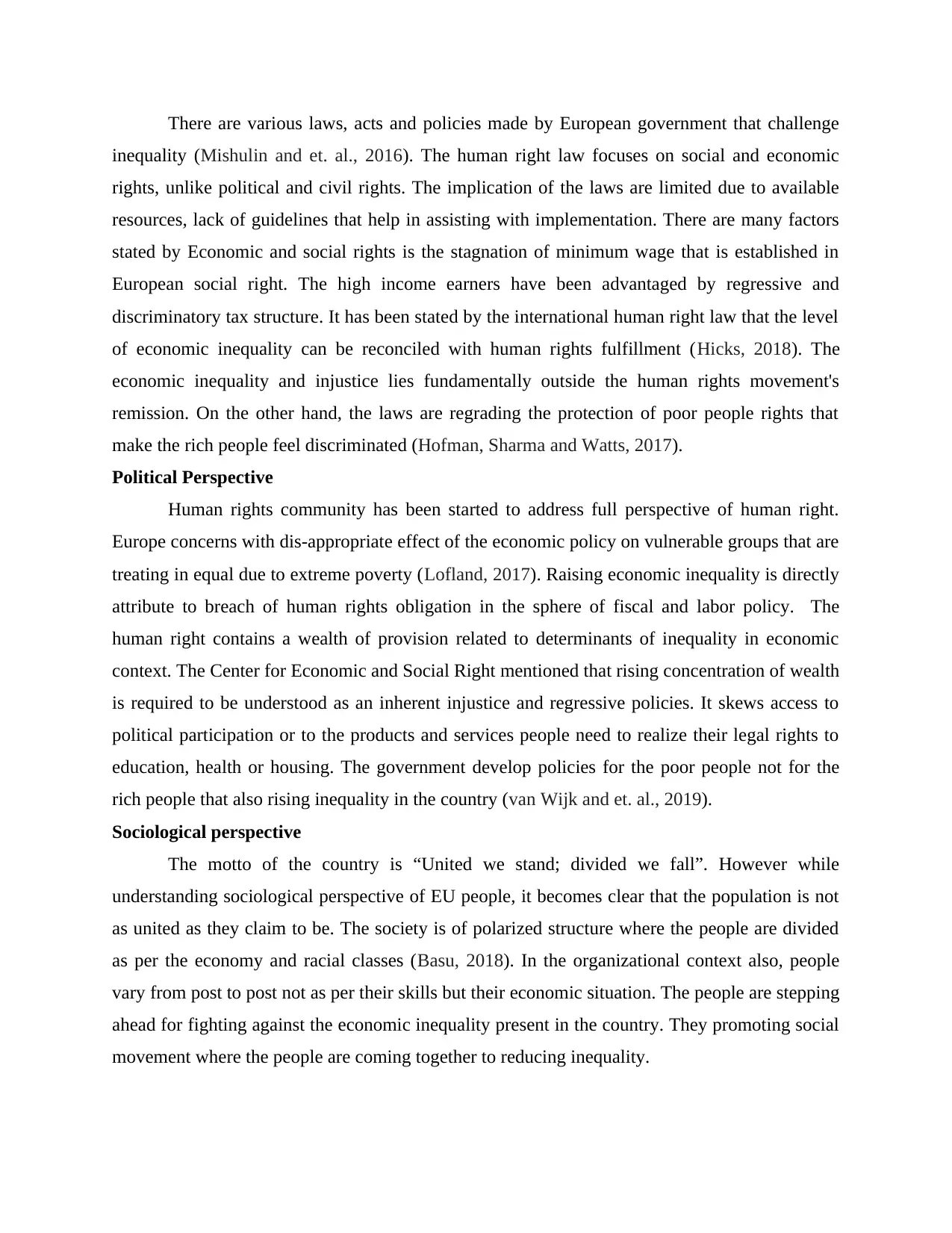
There are various laws, acts and policies made by European government that challenge
inequality (Mishulin and et. al., 2016). The human right law focuses on social and economic
rights, unlike political and civil rights. The implication of the laws are limited due to available
resources, lack of guidelines that help in assisting with implementation. There are many factors
stated by Economic and social rights is the stagnation of minimum wage that is established in
European social right. The high income earners have been advantaged by regressive and
discriminatory tax structure. It has been stated by the international human right law that the level
of economic inequality can be reconciled with human rights fulfillment (Hicks, 2018). The
economic inequality and injustice lies fundamentally outside the human rights movement's
remission. On the other hand, the laws are regrading the protection of poor people rights that
make the rich people feel discriminated (Hofman, Sharma and Watts, 2017).
Political Perspective
Human rights community has been started to address full perspective of human right.
Europe concerns with dis-appropriate effect of the economic policy on vulnerable groups that are
treating in equal due to extreme poverty (Lofland, 2017). Raising economic inequality is directly
attribute to breach of human rights obligation in the sphere of fiscal and labor policy. The
human right contains a wealth of provision related to determinants of inequality in economic
context. The Center for Economic and Social Right mentioned that rising concentration of wealth
is required to be understood as an inherent injustice and regressive policies. It skews access to
political participation or to the products and services people need to realize their legal rights to
education, health or housing. The government develop policies for the poor people not for the
rich people that also rising inequality in the country (van Wijk and et. al., 2019).
Sociological perspective
The motto of the country is “United we stand; divided we fall”. However while
understanding sociological perspective of EU people, it becomes clear that the population is not
as united as they claim to be. The society is of polarized structure where the people are divided
as per the economy and racial classes (Basu, 2018). In the organizational context also, people
vary from post to post not as per their skills but their economic situation. The people are stepping
ahead for fighting against the economic inequality present in the country. They promoting social
movement where the people are coming together to reducing inequality.
inequality (Mishulin and et. al., 2016). The human right law focuses on social and economic
rights, unlike political and civil rights. The implication of the laws are limited due to available
resources, lack of guidelines that help in assisting with implementation. There are many factors
stated by Economic and social rights is the stagnation of minimum wage that is established in
European social right. The high income earners have been advantaged by regressive and
discriminatory tax structure. It has been stated by the international human right law that the level
of economic inequality can be reconciled with human rights fulfillment (Hicks, 2018). The
economic inequality and injustice lies fundamentally outside the human rights movement's
remission. On the other hand, the laws are regrading the protection of poor people rights that
make the rich people feel discriminated (Hofman, Sharma and Watts, 2017).
Political Perspective
Human rights community has been started to address full perspective of human right.
Europe concerns with dis-appropriate effect of the economic policy on vulnerable groups that are
treating in equal due to extreme poverty (Lofland, 2017). Raising economic inequality is directly
attribute to breach of human rights obligation in the sphere of fiscal and labor policy. The
human right contains a wealth of provision related to determinants of inequality in economic
context. The Center for Economic and Social Right mentioned that rising concentration of wealth
is required to be understood as an inherent injustice and regressive policies. It skews access to
political participation or to the products and services people need to realize their legal rights to
education, health or housing. The government develop policies for the poor people not for the
rich people that also rising inequality in the country (van Wijk and et. al., 2019).
Sociological perspective
The motto of the country is “United we stand; divided we fall”. However while
understanding sociological perspective of EU people, it becomes clear that the population is not
as united as they claim to be. The society is of polarized structure where the people are divided
as per the economy and racial classes (Basu, 2018). In the organizational context also, people
vary from post to post not as per their skills but their economic situation. The people are stepping
ahead for fighting against the economic inequality present in the country. They promoting social
movement where the people are coming together to reducing inequality.
Paraphrase This Document
Need a fresh take? Get an instant paraphrase of this document with our AI Paraphraser
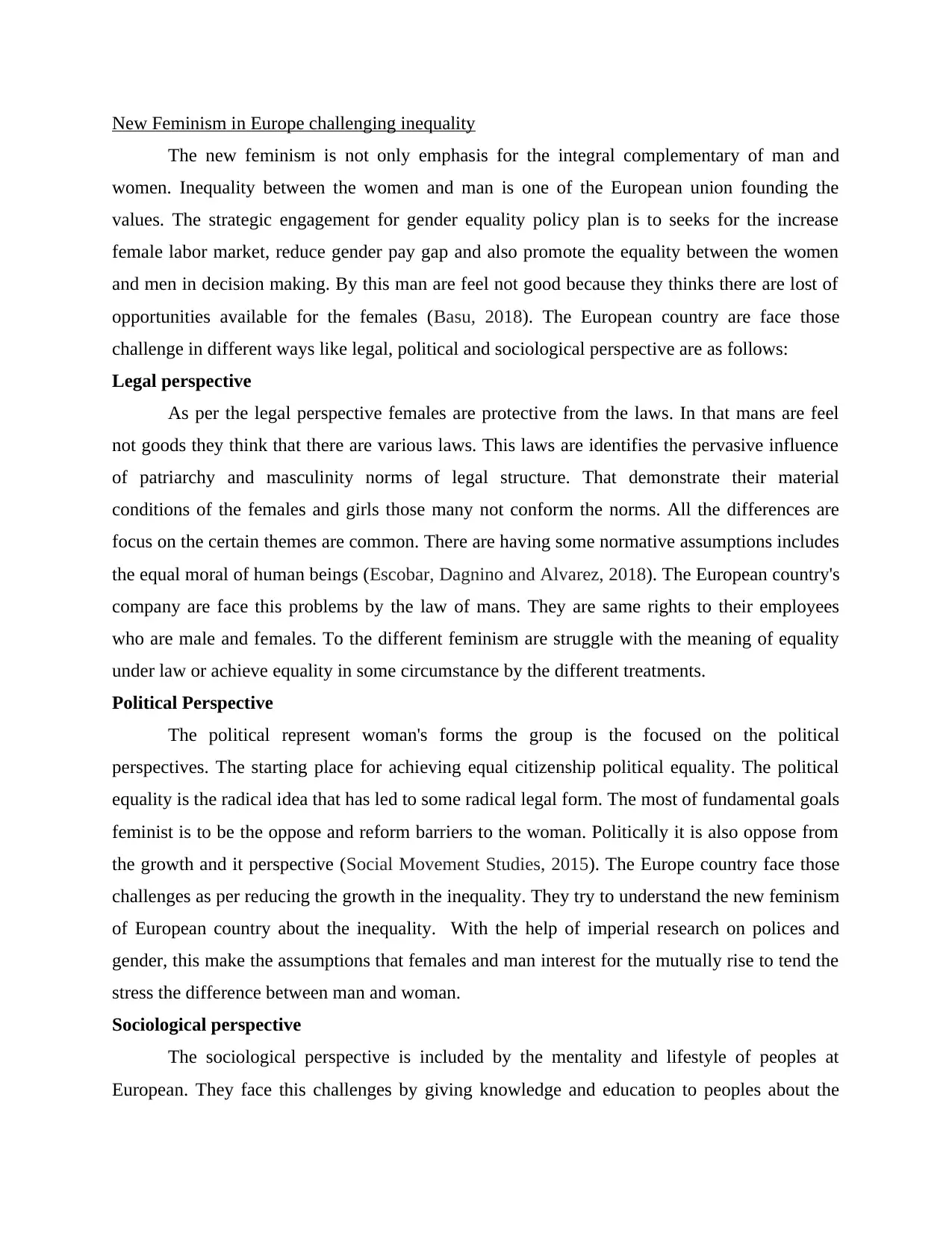
New Feminism in Europe challenging inequality
The new feminism is not only emphasis for the integral complementary of man and
women. Inequality between the women and man is one of the European union founding the
values. The strategic engagement for gender equality policy plan is to seeks for the increase
female labor market, reduce gender pay gap and also promote the equality between the women
and men in decision making. By this man are feel not good because they thinks there are lost of
opportunities available for the females (Basu, 2018). The European country are face those
challenge in different ways like legal, political and sociological perspective are as follows:
Legal perspective
As per the legal perspective females are protective from the laws. In that mans are feel
not goods they think that there are various laws. This laws are identifies the pervasive influence
of patriarchy and masculinity norms of legal structure. That demonstrate their material
conditions of the females and girls those many not conform the norms. All the differences are
focus on the certain themes are common. There are having some normative assumptions includes
the equal moral of human beings (Escobar, Dagnino and Alvarez, 2018). The European country's
company are face this problems by the law of mans. They are same rights to their employees
who are male and females. To the different feminism are struggle with the meaning of equality
under law or achieve equality in some circumstance by the different treatments.
Political Perspective
The political represent woman's forms the group is the focused on the political
perspectives. The starting place for achieving equal citizenship political equality. The political
equality is the radical idea that has led to some radical legal form. The most of fundamental goals
feminist is to be the oppose and reform barriers to the woman. Politically it is also oppose from
the growth and it perspective (Social Movement Studies, 2015). The Europe country face those
challenges as per reducing the growth in the inequality. They try to understand the new feminism
of European country about the inequality. With the help of imperial research on polices and
gender, this make the assumptions that females and man interest for the mutually rise to tend the
stress the difference between man and woman.
Sociological perspective
The sociological perspective is included by the mentality and lifestyle of peoples at
European. They face this challenges by giving knowledge and education to peoples about the
The new feminism is not only emphasis for the integral complementary of man and
women. Inequality between the women and man is one of the European union founding the
values. The strategic engagement for gender equality policy plan is to seeks for the increase
female labor market, reduce gender pay gap and also promote the equality between the women
and men in decision making. By this man are feel not good because they thinks there are lost of
opportunities available for the females (Basu, 2018). The European country are face those
challenge in different ways like legal, political and sociological perspective are as follows:
Legal perspective
As per the legal perspective females are protective from the laws. In that mans are feel
not goods they think that there are various laws. This laws are identifies the pervasive influence
of patriarchy and masculinity norms of legal structure. That demonstrate their material
conditions of the females and girls those many not conform the norms. All the differences are
focus on the certain themes are common. There are having some normative assumptions includes
the equal moral of human beings (Escobar, Dagnino and Alvarez, 2018). The European country's
company are face this problems by the law of mans. They are same rights to their employees
who are male and females. To the different feminism are struggle with the meaning of equality
under law or achieve equality in some circumstance by the different treatments.
Political Perspective
The political represent woman's forms the group is the focused on the political
perspectives. The starting place for achieving equal citizenship political equality. The political
equality is the radical idea that has led to some radical legal form. The most of fundamental goals
feminist is to be the oppose and reform barriers to the woman. Politically it is also oppose from
the growth and it perspective (Social Movement Studies, 2015). The Europe country face those
challenges as per reducing the growth in the inequality. They try to understand the new feminism
of European country about the inequality. With the help of imperial research on polices and
gender, this make the assumptions that females and man interest for the mutually rise to tend the
stress the difference between man and woman.
Sociological perspective
The sociological perspective is included by the mentality and lifestyle of peoples at
European. They face this challenges by giving knowledge and education to peoples about the
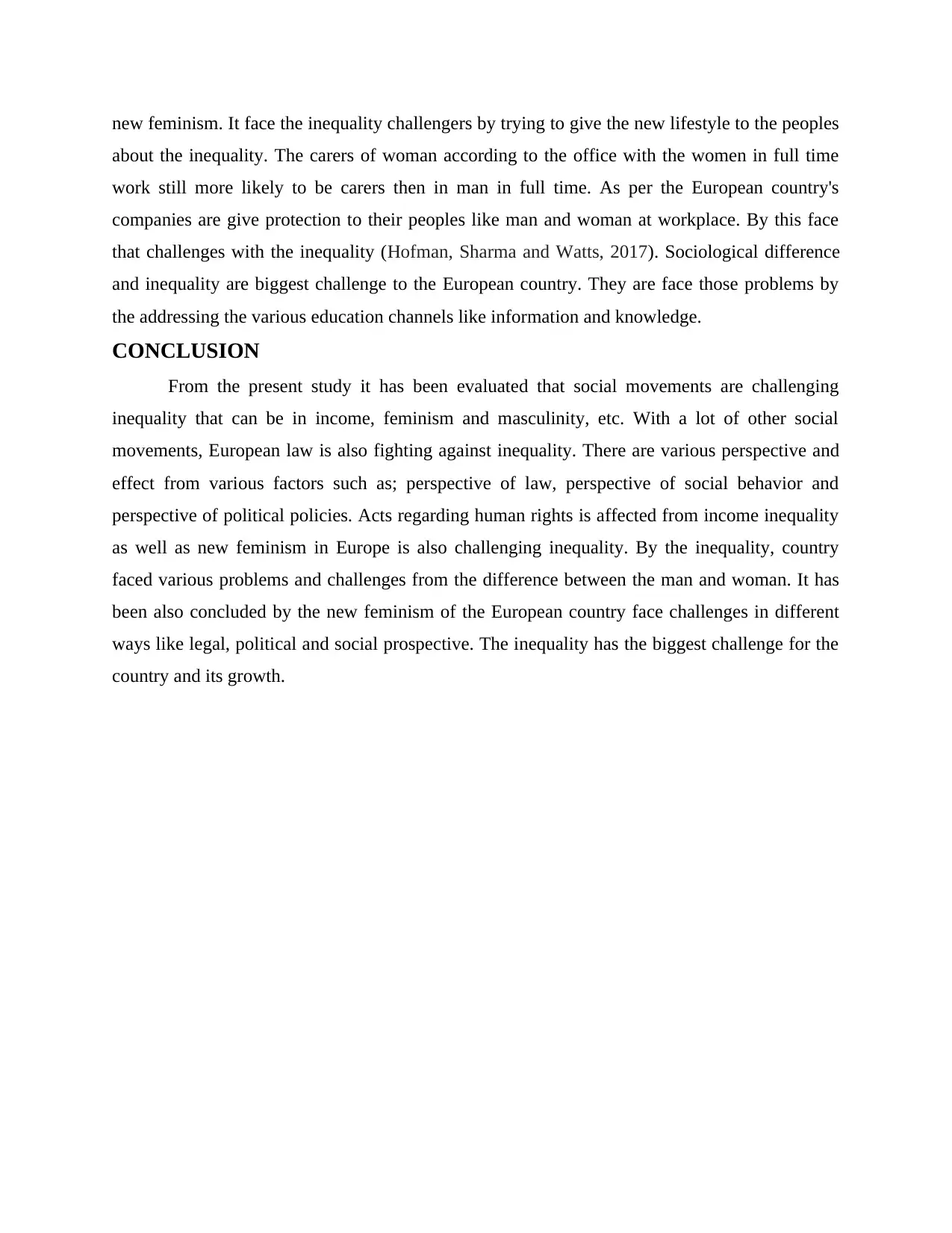
new feminism. It face the inequality challengers by trying to give the new lifestyle to the peoples
about the inequality. The carers of woman according to the office with the women in full time
work still more likely to be carers then in man in full time. As per the European country's
companies are give protection to their peoples like man and woman at workplace. By this face
that challenges with the inequality (Hofman, Sharma and Watts, 2017). Sociological difference
and inequality are biggest challenge to the European country. They are face those problems by
the addressing the various education channels like information and knowledge.
CONCLUSION
From the present study it has been evaluated that social movements are challenging
inequality that can be in income, feminism and masculinity, etc. With a lot of other social
movements, European law is also fighting against inequality. There are various perspective and
effect from various factors such as; perspective of law, perspective of social behavior and
perspective of political policies. Acts regarding human rights is affected from income inequality
as well as new feminism in Europe is also challenging inequality. By the inequality, country
faced various problems and challenges from the difference between the man and woman. It has
been also concluded by the new feminism of the European country face challenges in different
ways like legal, political and social prospective. The inequality has the biggest challenge for the
country and its growth.
about the inequality. The carers of woman according to the office with the women in full time
work still more likely to be carers then in man in full time. As per the European country's
companies are give protection to their peoples like man and woman at workplace. By this face
that challenges with the inequality (Hofman, Sharma and Watts, 2017). Sociological difference
and inequality are biggest challenge to the European country. They are face those problems by
the addressing the various education channels like information and knowledge.
CONCLUSION
From the present study it has been evaluated that social movements are challenging
inequality that can be in income, feminism and masculinity, etc. With a lot of other social
movements, European law is also fighting against inequality. There are various perspective and
effect from various factors such as; perspective of law, perspective of social behavior and
perspective of political policies. Acts regarding human rights is affected from income inequality
as well as new feminism in Europe is also challenging inequality. By the inequality, country
faced various problems and challenges from the difference between the man and woman. It has
been also concluded by the new feminism of the European country face challenges in different
ways like legal, political and social prospective. The inequality has the biggest challenge for the
country and its growth.
⊘ This is a preview!⊘
Do you want full access?
Subscribe today to unlock all pages.

Trusted by 1+ million students worldwide
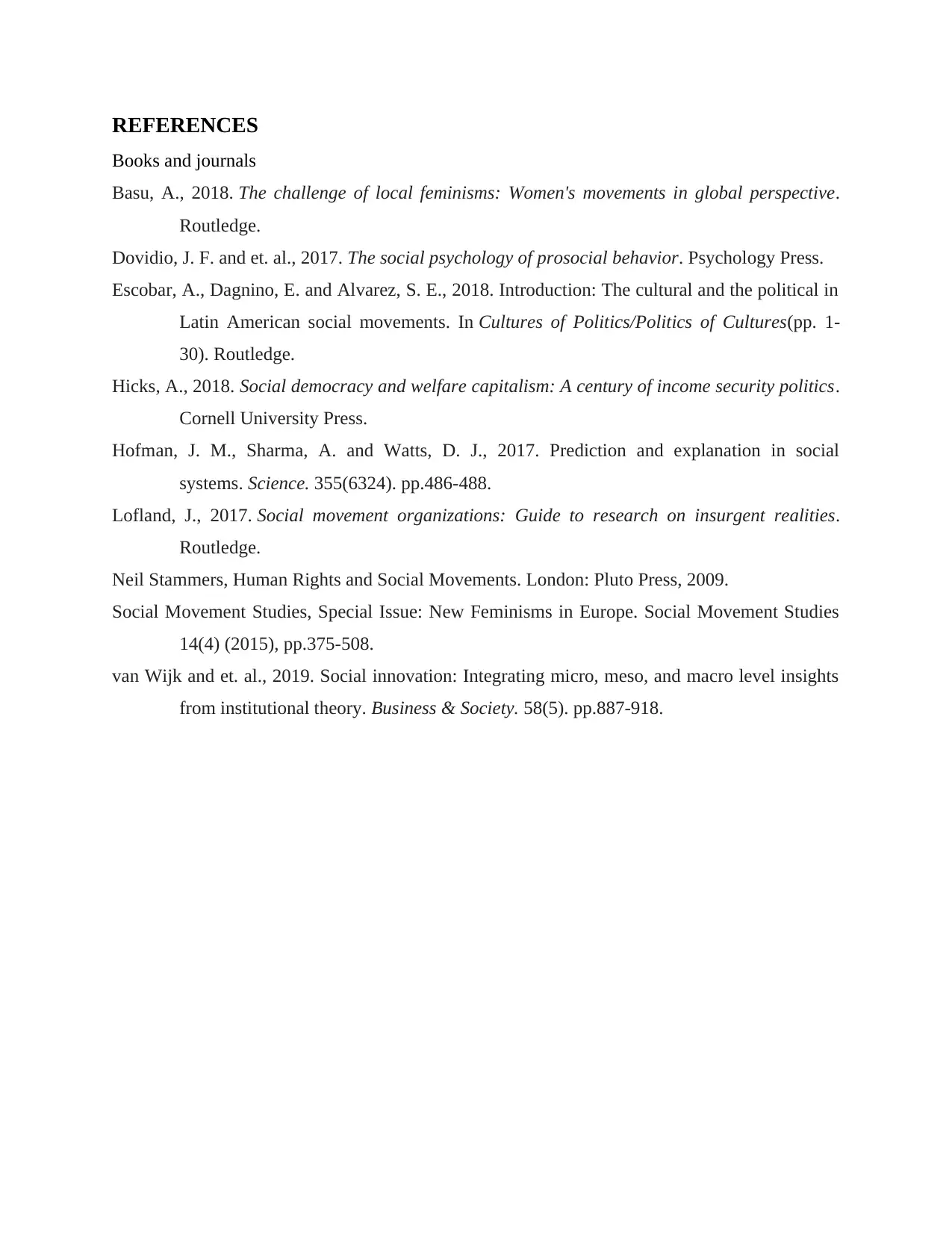
REFERENCES
Books and journals
Basu, A., 2018. The challenge of local feminisms: Women's movements in global perspective.
Routledge.
Dovidio, J. F. and et. al., 2017. The social psychology of prosocial behavior. Psychology Press.
Escobar, A., Dagnino, E. and Alvarez, S. E., 2018. Introduction: The cultural and the political in
Latin American social movements. In Cultures of Politics/Politics of Cultures(pp. 1-
30). Routledge.
Hicks, A., 2018. Social democracy and welfare capitalism: A century of income security politics.
Cornell University Press.
Hofman, J. M., Sharma, A. and Watts, D. J., 2017. Prediction and explanation in social
systems. Science. 355(6324). pp.486-488.
Lofland, J., 2017. Social movement organizations: Guide to research on insurgent realities.
Routledge.
Neil Stammers, Human Rights and Social Movements. London: Pluto Press, 2009.
Social Movement Studies, Special Issue: New Feminisms in Europe. Social Movement Studies
14(4) (2015), pp.375-508.
van Wijk and et. al., 2019. Social innovation: Integrating micro, meso, and macro level insights
from institutional theory. Business & Society. 58(5). pp.887-918.
Books and journals
Basu, A., 2018. The challenge of local feminisms: Women's movements in global perspective.
Routledge.
Dovidio, J. F. and et. al., 2017. The social psychology of prosocial behavior. Psychology Press.
Escobar, A., Dagnino, E. and Alvarez, S. E., 2018. Introduction: The cultural and the political in
Latin American social movements. In Cultures of Politics/Politics of Cultures(pp. 1-
30). Routledge.
Hicks, A., 2018. Social democracy and welfare capitalism: A century of income security politics.
Cornell University Press.
Hofman, J. M., Sharma, A. and Watts, D. J., 2017. Prediction and explanation in social
systems. Science. 355(6324). pp.486-488.
Lofland, J., 2017. Social movement organizations: Guide to research on insurgent realities.
Routledge.
Neil Stammers, Human Rights and Social Movements. London: Pluto Press, 2009.
Social Movement Studies, Special Issue: New Feminisms in Europe. Social Movement Studies
14(4) (2015), pp.375-508.
van Wijk and et. al., 2019. Social innovation: Integrating micro, meso, and macro level insights
from institutional theory. Business & Society. 58(5). pp.887-918.
Paraphrase This Document
Need a fresh take? Get an instant paraphrase of this document with our AI Paraphraser

REFERENCES
Books and Journals
Online
Books and Journals
Online
1 out of 8
Related Documents
Your All-in-One AI-Powered Toolkit for Academic Success.
+13062052269
info@desklib.com
Available 24*7 on WhatsApp / Email
![[object Object]](/_next/static/media/star-bottom.7253800d.svg)
Unlock your academic potential
Copyright © 2020–2025 A2Z Services. All Rights Reserved. Developed and managed by ZUCOL.





